九年级上册 Unit 7-8(讲练学案)-2023年中考英语第一轮复习讲练测(沪教牛津版)
文档属性
| 名称 | 九年级上册 Unit 7-8(讲练学案)-2023年中考英语第一轮复习讲练测(沪教牛津版) | 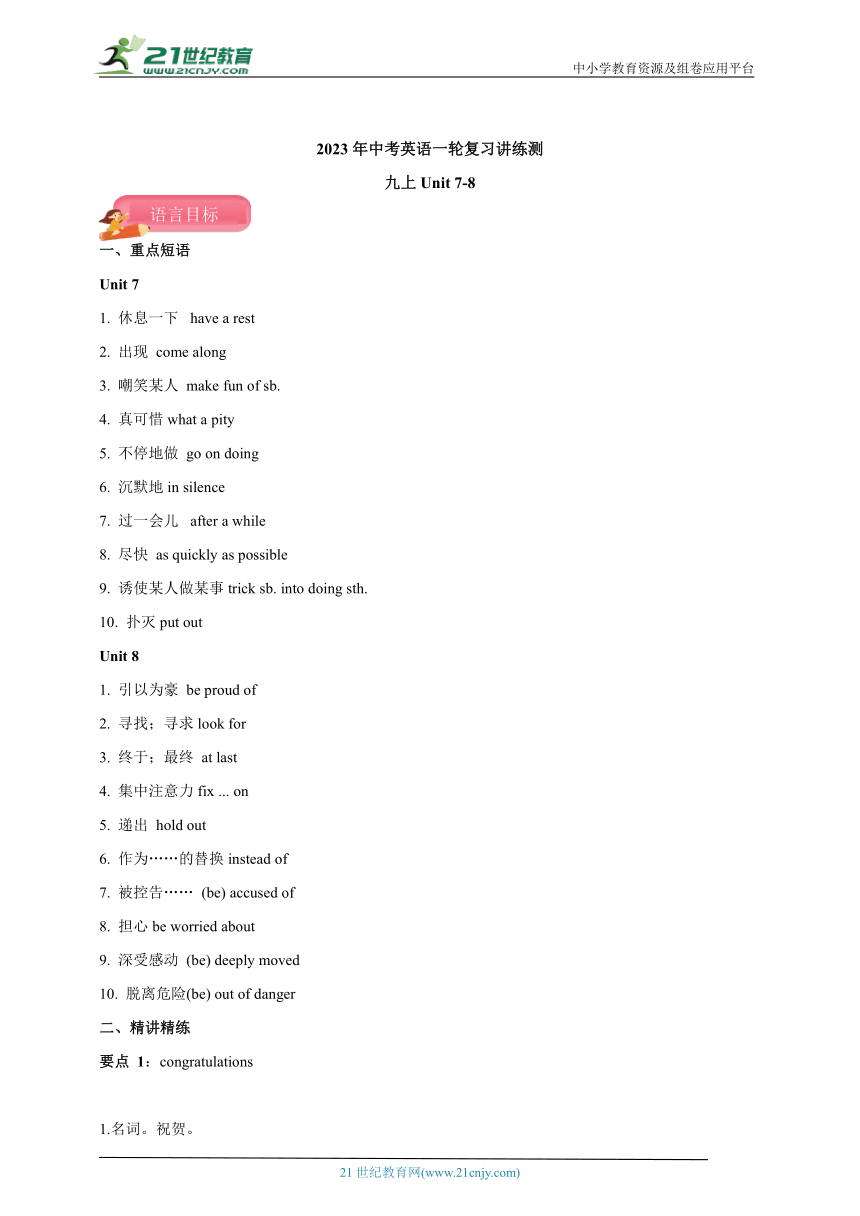 | |
| 格式 | docx | ||
| 文件大小 | 939.7KB | ||
| 资源类型 | 试卷 | ||
| 版本资源 | 牛津深圳版 | ||
| 科目 | 英语 | ||
| 更新时间 | 2023-02-23 21:31:41 | ||
图片预览

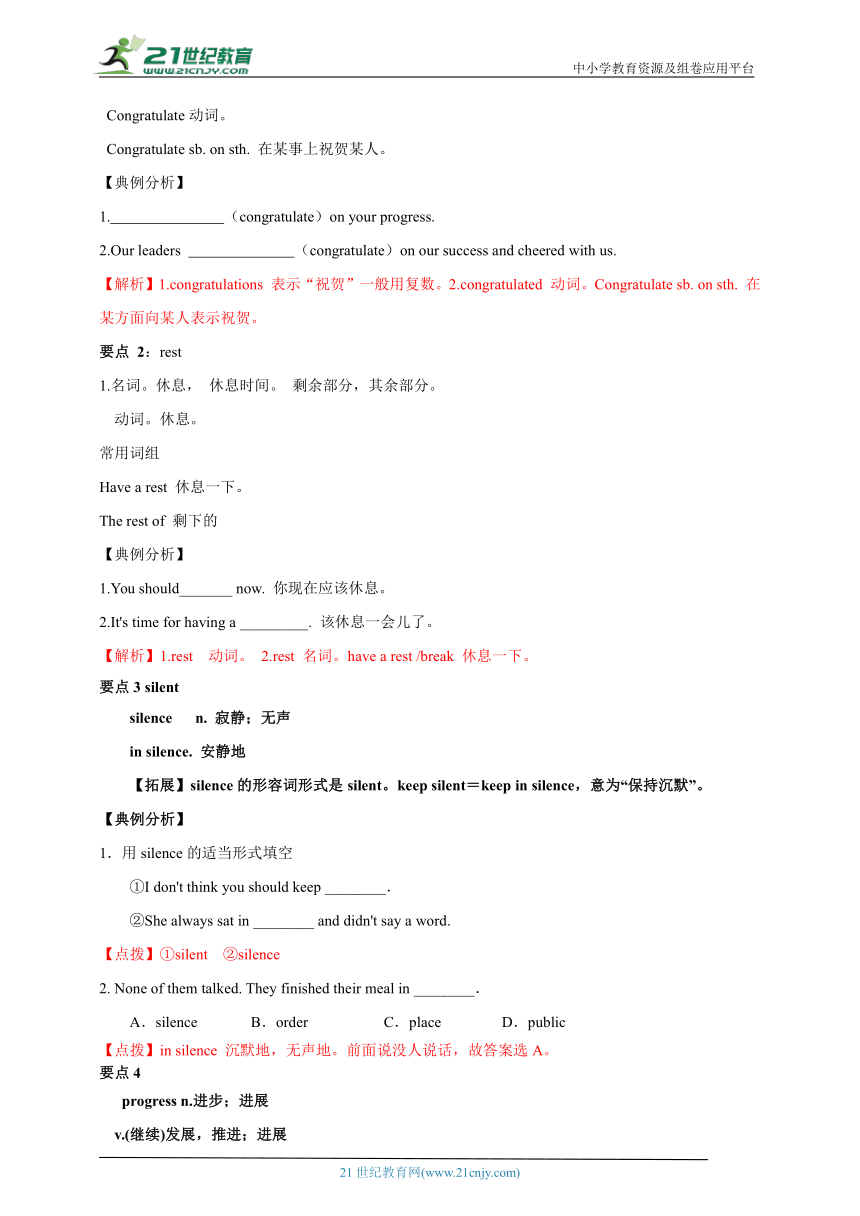
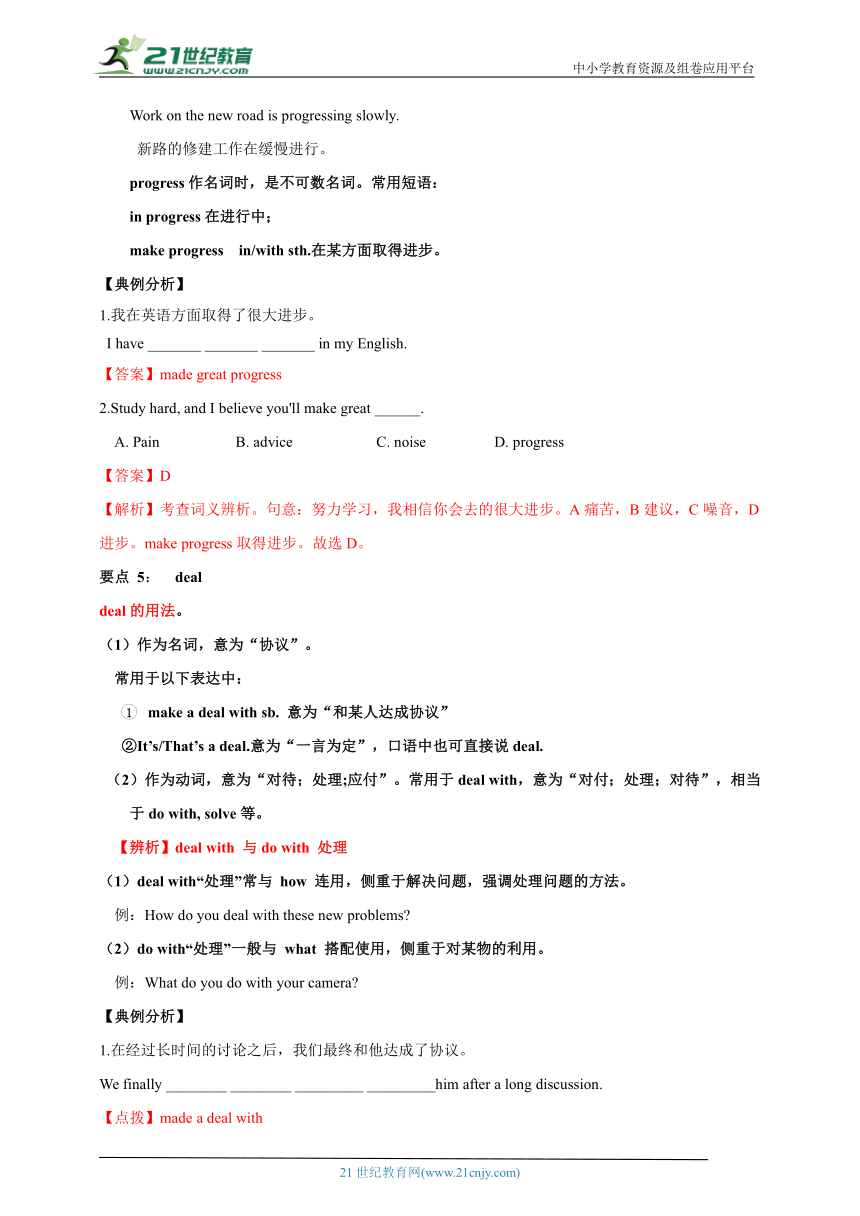
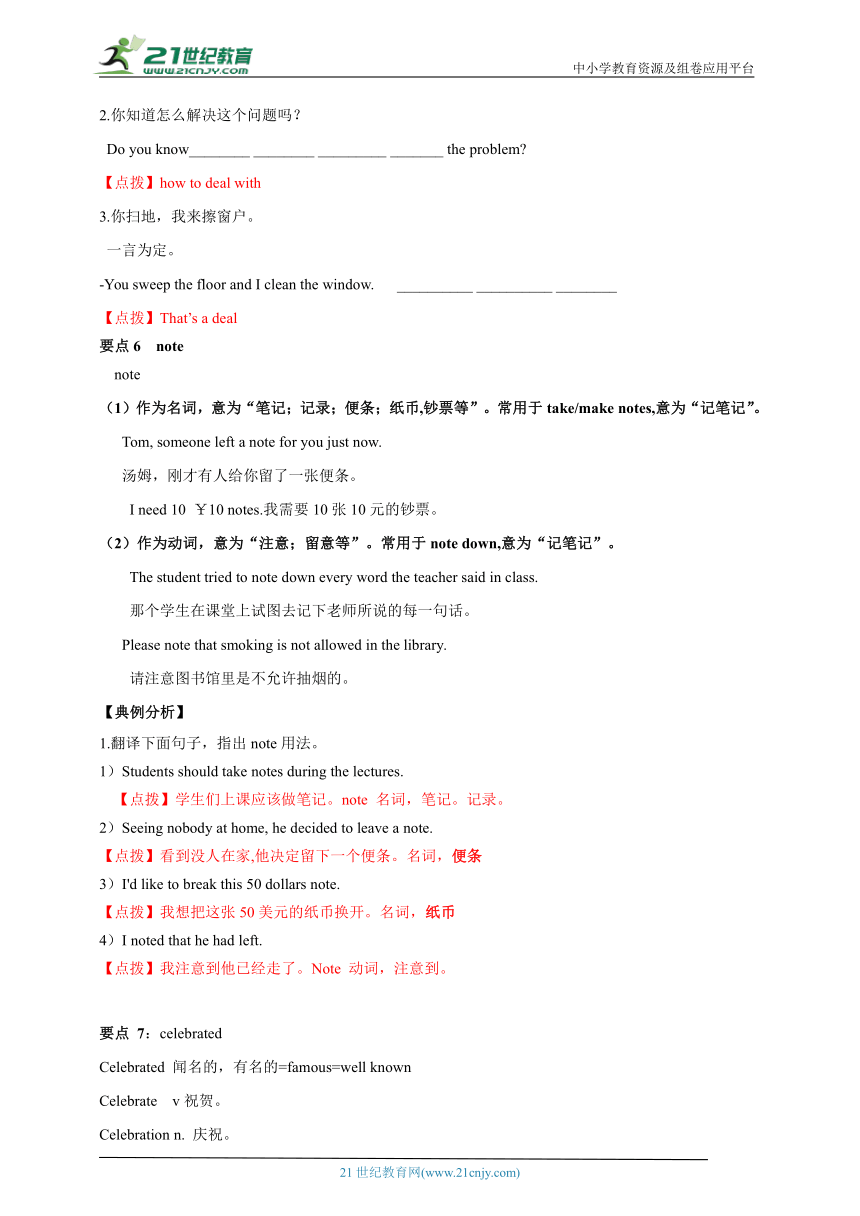
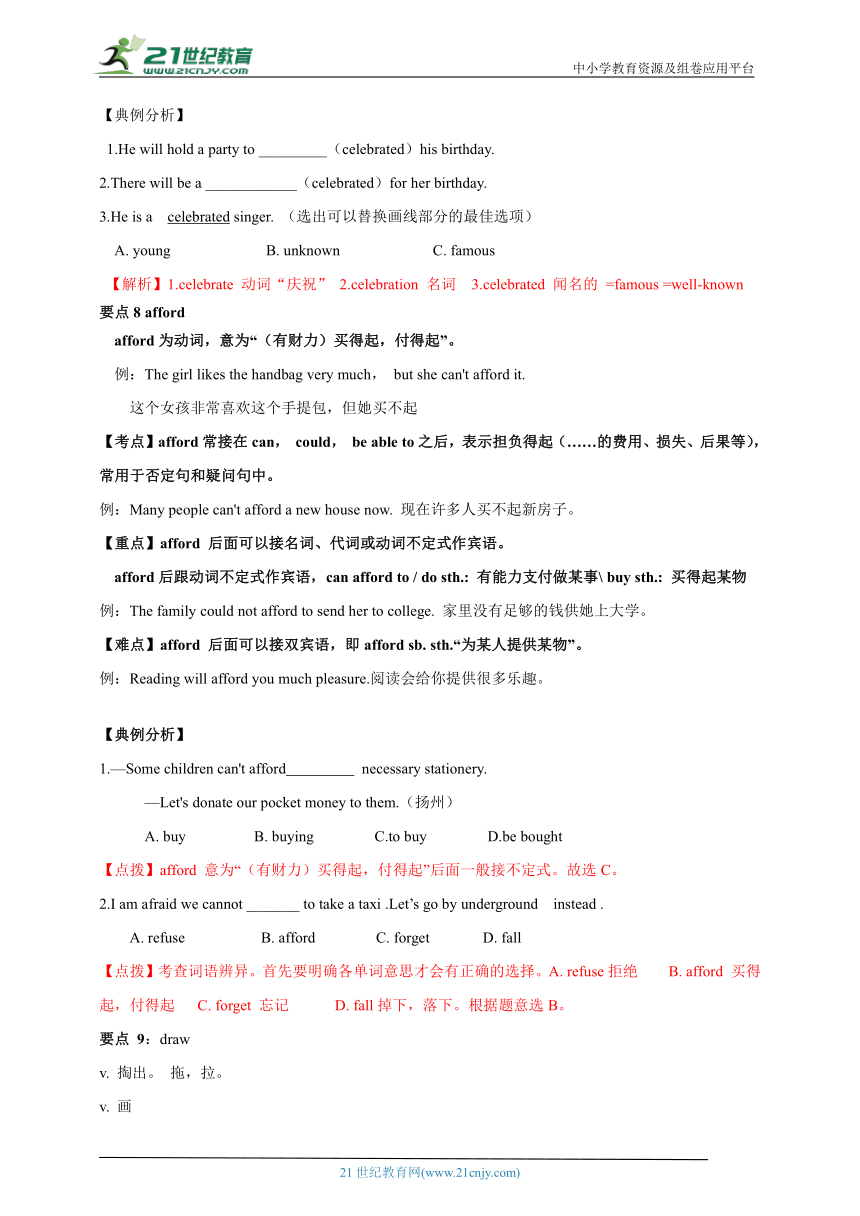
文档简介
中小学教育资源及组卷应用平台
2023年中考英语一轮复习讲练测
九上Unit 7-8
一、重点短语
Unit 7
1. 休息一下 have a rest
2. 出现 come along
3. 嘲笑某人 make fun of sb.
4. 真可惜what a pity
5. 不停地做 go on doing
6. 沉默地in silence
7. 过一会儿 after a while
8. 尽快 as quickly as possible
9. 诱使某人做某事trick sb. into doing sth.
10. 扑灭put out
Unit 8
1. 引以为豪 be proud of
2. 寻找;寻求look for
3. 终于;最终 at last
4. 集中注意力fix ... on
5. 递出 hold out
6. 作为……的替换instead of
7. 被控告…… (be) accused of
8. 担心be worried about
9. 深受感动 (be) deeply moved
10. 脱离危险(be) out of danger
二、精讲精练
要点 1:congratulations
1.名词。祝贺。
Congratulate动词。
Congratulate sb. on sth. 在某事上祝贺某人。
【典例分析】
1. (congratulate)on your progress.
2.Our leaders (congratulate)on our success and cheered with us.
【解析】1.congratulations 表示“祝贺”一般用复数。2.congratulated 动词。Congratulate sb. on sth. 在某方面向某人表示祝贺。
要点 2:rest
1.名词。休息, 休息时间。 剩余部分,其余部分。
动词。休息。
常用词组
Have a rest 休息一下。
The rest of 剩下的
【典例分析】
1.You should_______ now. 你现在应该休息。
2.It's time for having a _________. 该休息一会儿了。
【解析】1.rest 动词。 2.rest 名词。have a rest /break 休息一下。
要点3 silent
silence n. 寂静;无声
in silence. 安静地
【拓展】silence的形容词形式是silent。keep silent=keep in silence,意为“保持沉默”。
【典例分析】
1.用silence的适当形式填空
①I don't think you should keep ________.
②She always sat in ________ and didn't say a word.
【点拨】①silent ②silence
2. None of them talked. They finished their meal in ________.
A.silence B.order C.place D.public
【点拨】in silence 沉默地,无声地。前面说没人说话,故答案选A。
要点4
progress n.进步;进展
v.(继续)发展,推进;进展
Work on the new road is progressing slowly.
新路的修建工作在缓慢进行。
progress作名词时,是不可数名词。常用短语:
in progress在进行中;
make progress in/with sth.在某方面取得进步。
【典例分析】
1.我在英语方面取得了很大进步。
I have _______ _______ _______ in my English.
【答案】made great progress
2.Study hard, and I believe you'll make great ______.
A. Pain B. advice C. noise D. progress
【答案】D
【解析】考查词义辨析。句意:努力学习,我相信你会去的很大进步。A痛苦,B建议,C噪音,D进步。make progress取得进步。故选D。
要点 5: deal
deal的用法。
(1)作为名词,意为“协议”。
常用于以下表达中:
make a deal with sb. 意为“和某人达成协议”
②It’s/That’s a deal.意为“一言为定”,口语中也可直接说deal.
(2)作为动词,意为“对待;处理;应付”。常用于deal with,意为“对付;处理;对待”,相当于do with, solve等。
【辨析】deal with 与do with 处理
deal with“处理”常与 how 连用,侧重于解决问题,强调处理问题的方法。
例:How do you deal with these new problems
(2)do with“处理”一般与 what 搭配使用,侧重于对某物的利用。
例:What do you do with your camera
【典例分析】
1.在经过长时间的讨论之后,我们最终和他达成了协议。
We finally ________ ________ _________ _________him after a long discussion.
【点拨】made a deal with
2.你知道怎么解决这个问题吗?
Do you know________ ________ _________ _______ the problem
【点拨】how to deal with
3.你扫地,我来擦窗户。
一言为定。
-You sweep the floor and I clean the window. __________ __________ ________
【点拨】That’s a deal
要点6 note
note
(1)作为名词,意为“笔记;记录;便条;纸币,钞票等”。常用于take/make notes,意为“记笔记”。
Tom, someone left a note for you just now.
汤姆,刚才有人给你留了一张便条。
I need 10 ¥10 notes.我需要10张10元的钞票。
(2)作为动词,意为“注意;留意等”。常用于note down,意为“记笔记”。
The student tried to note down every word the teacher said in class.
那个学生在课堂上试图去记下老师所说的每一句话。
Please note that smoking is not allowed in the library.
请注意图书馆里是不允许抽烟的。
【典例分析】
1.翻译下面句子,指出note用法。
1)Students should take notes during the lectures.
【点拨】学生们上课应该做笔记。note 名词,笔记。记录。
2)Seeing nobody at home, he decided to leave a note.
【点拨】看到没人在家,他决定留下一个便条。名词,便条
3)I'd like to break this 50 dollars note.
【点拨】我想把这张50美元的纸币换开。名词,纸币
4)I noted that he had left.
【点拨】我注意到他已经走了。Note 动词,注意到。
要点 7:celebrated
Celebrated 闻名的,有名的=famous=well known
Celebrate v祝贺。
Celebration n. 庆祝。
【典例分析】
1.He will hold a party to _________(celebrated)his birthday.
2.There will be a ____________(celebrated)for her birthday.
3.He is a celebrated singer. (选出可以替换画线部分的最佳选项)
A. young B. unknown C. famous
【解析】1.celebrate 动词“庆祝” 2.celebration 名词 3.celebrated 闻名的 =famous =well-known
要点8 afford
afford为动词,意为“(有财力)买得起,付得起”。
例:The girl likes the handbag very much, but she can't afford it.
这个女孩非常喜欢这个手提包,但她买不起
【考点】afford常接在can, could, be able to之后,表示担负得起(……的费用、损失、后果等),常用于否定句和疑问句中。
例:Many people can't afford a new house now. 现在许多人买不起新房子。
【重点】afford 后面可以接名词、代词或动词不定式作宾语。
afford后跟动词不定式作宾语,can afford to / do sth.: 有能力支付做某事\ buy sth.: 买得起某物
例:The family could not afford to send her to college. 家里没有足够的钱供她上大学。
【难点】afford 后面可以接双宾语,即afford sb. sth.“为某人提供某物”。
例:Reading will afford you much pleasure.阅读会给你提供很多乐趣。
【典例分析】
1.—Some children can't afford necessary stationery.
—Let's donate our pocket money to them.(扬州)
A. buy B. buying C.to buy D.be bought
【点拨】afford 意为“(有财力)买得起,付得起”后面一般接不定式。故选C。
2.I am afraid we cannot _______ to take a taxi .Let’s go by underground instead .
A. refuse B. afford C. forget D. fall
【点拨】考查词语辨异。首先要明确各单词意思才会有正确的选择。A. refuse拒绝 B. afford 买得起,付得起 C. forget 忘记 D. fall掉下,落下。根据题意选B。
要点 9:draw
v. 掏出。 拖,拉。
v. 画
drawer 抽屉
draw out 掏出。
Draw one’s attention 引起注意。
【典例分析】
1. He put his pen in the ___________(draw).
2. He drew out a gun and fired. (选出可以替换画线部分的最佳选项)
A. took B. bought C. held
3.他把椅子轻轻拉近火边
He __________ his chair nearer the fire.
【解析】1.drawer 抽屉。 2.draw 掏出 3.drew 拖拉。
要点10 hold
hold 是动词,意为“举行,举办,召开”,常可以用have来替换,过去式和过去分词均为held。
hold a meeting举行会议
hold a concert举行音乐会
hold a sports meeting举行运动会
【拓展】hold的其他含义:
hold 保持;维持 How long will this fine weather hold 这样的好天气能维持多久?
抓住;握住;拿住 He held the thief by the arm. 他抓住那个小偷的胳膊。
容纳;包含 Our classroom can hold more than fifty students. 教室能容纳50多个学生。
支撑……的重量 The chair can’t hold your weight. 这把椅子不能承受你的重量。
短语 catch hold of抓住; hold on(电话)别挂断;稍等
【典例分析】
1. The Olympic Games _____every four years.
A. are held B. were hold C. are holding D. will hold
【答案】C
【解析】:hold是动词。从本题句意知是一般现在时的被动语态,句意是“奥林匹克运动会每四年被举行一次”故此小题选C。
2、翻译,指出下面Hold在各句的意义。
1)He was holding the baby in his arms.
【答案】他用胳膊抱着婴儿。hold 抓住;握住
2)We hold a sports meeting twice a year in our school.
【答案】我们学校每年举行两次运动会。hold
3)Hold your head up.
【答案】抬起头来。hold up 抬起。
4)I don't think the chair can hold your weight.
【答案】我想这把椅子支撑不住你的重量。Hold 支撑……的重量
5)The plane holds about 300 passengers.
【答案】这架飞机大约容纳300名乘客。Hold 容纳;包含
要点11 present
(1)present作形容词,意为“出席的,在场的”;还意为“现在的,当前的”。例如:
How many people were present at the meeting 到会的有多少人
(2)present作名词,意为“礼物,赠品”。the present意为“现在,目前”。
例如:
He often gave his neighbor’s kids little presents.
他常常送些小礼物给邻居的孩子。
(3)present作及物动词,意为“赠送,呈献”后接to/with。例如:
They presented him with a bunch of flowers. 他们献给他一束鲜花。
present sth to sb = present sb with sth 赠予、授予某人某物
at present(名词) = at the present(形容词) time 目前;现在
【典例分析】
1.Tim saved two students in the fire. The headmaster will ________ the prize to him at the meeting.
A. promise B. practise C. prepare D. present
【答案】本题考查动词辨析。promise 意为“保证;承诺”,practise意为“练习”,prepare意为“准备”, present意为“授予”,结合语境可知应选D。
2. 我的朋友送给我一把漂亮的扇子作为礼物。
My friend gave me a beautiful fan _________ _________ ______________.
【答案】as a present
要点 12:put on wear dress 区别
put on着重强调“穿(戴) 上”的动作,后接衣服、鞋帽等,其反义词组为take off。
2.“(be)in+颜色或服装、眼镜等”表示“穿着”的状态,在句中作表语或定语。
He is in uniform today. 他今天穿着制服。
3.wear主要用于穿衣服、戴眼镜(手套、首饰、帽子)等,强调“穿(戴)着”的状态。
Mrs. Wu always wears a blue coat in winter. 吴老师冬天总是穿着一件蓝色大衣。
4.dress既可作及物动词,又可作不及物动词,所接宾语是人而不是衣、帽等物。
要点13
pride的词形变化级短语用法:
① pride (n.) 骄傲,自豪------->常用短语:take pride in……为……感到骄傲
② proud (adj.) 骄傲的,自豪的------->常用短语:be proud of……为……感到骄傲
【典例分析】
1.我妈妈为我感到骄傲。
My mother _______ _________ ____________ me.
= My mother _______ _________ ____________ me.
【答案】takes pride in is proud of
2.The girl does well in all the subjects. Her parents ________ her.
A. take photos of B. take part in C. take care of D. take pride in
【答案】本题考查短语动词辨析。take photos of 意为“拍……的照片”,take part in 意为“参加;参与”,take care of 意为“照顾;护理”,take pride in意为“感到自豪”,结合语境可知应选D。
3. —Are the whole family________ of the girl
—Certainly. She is the family's________.
A. proud; proud B. proud; pride C. pride; pride D. pride; proud
【答案】B句意:——全家人都为这个女孩骄傲吗?——当然。她是家庭的骄傲。考查形容词和名词辨析题。proud骄傲的/自豪的,形容词;pride骄傲/自豪,名词。be proud of为…而感到骄傲,问句缺表语形容词,可排除CD选项。答句中family's是名词所有格,需接名词,可排除A。根据句意结构,可知选B。
要点 14 look for: 寻找
考点拓展:与look相关的常见短语
look after 照顾,照料
look around/about 四处看看,四下环顾
look forward to sth./doing sth.盼望,期待
look on … as …… 把……看作……
look out (for)当心,小心,留神
look through 浏览,翻阅,温习,仔细查看
look up 查寻,查阅, 仰视
look over 检查
【典例分析】
1. 用上面look构成的短语填空
1. He _______ his notes before writing the report.
2.I must _____ the time of your train.
3._________! There is danger ahead.
4.The girl is old enough to ________ himself.
5.He spent two weeks in Shanghai,looking _____ the city.
6.We are ________ ________ _________ hearing from you soon.
7.They all _________ ________ him _________ a member of their family.
【解析】1. looked through 浏览 2. look up 查寻,查阅, 3. Look out 4. look after 照顾,照料
5.looking around/about四处看看,四下环顾 6. Looking forward to盼望,期待 7. looked on … as …… 把……看作…
要点15 put on: 穿上;戴上
考点拓展:与put相关的常见短语
put on: 上演, 穿上;戴上
put up:举起,抬起,张贴
put off:推迟,拖延
put down:放下,拒绝,镇压,记下来,写下来,
put out:扑灭;熄灭;
put away:收起来,收拾好
【典例分析】
1.We put ______ the tools before we leave the workshop.
2.Never put ______ until tomorrow what you can do today.
3.We are putting the play ______ again next week because of its success.
4.The fire man soon put the fire _______.
5. It’s time that we put _______ the Christmas decorations(装饰物)in the living room.
6. Drop your weapons(武器) and put your hands ________.
【解析】1.away put away收起来,收拾好 2.off put off:推迟,拖延 3. on put on: 上演,
4.out put out:扑灭;熄灭;5.up put up:举起,张贴 6.down put down:放下
who, that, which引导的定语从句
1 定语从句:在复合句中,修饰某一名词或代词的从句叫做定语从句。如:
This is the car (which/that) I bought last month. 这是我上个月买的车。
2 引导定语从句的关系代词有who, that和which等。关系代词放在先行词和定语从句之间,起联系作用,同时又作定语从句的一个成分。详见下表:
关系代词 用法 例 句
who 指人;在从句中作主语或宾语;作宾语时可以用whom,也可省略 I want to see one classmate who is ill. 我想去看望一位生病的同学。 Do you know the girl (who / whom) my brother is talking to 你认识那位正和我哥哥交谈的女孩吗?
that 既可指人,也可指物;在从句中作主语或宾语;作宾语时可省略 When I came into the classroom, there were some students that were talking about the TV play. 我进教室的时候,有一些学生正在谈论电视剧。 The last lesson (that) the professor gave was not easily forgotten. 教授上的最后一堂课令人难忘。
which 指物;在从句中作主语或宾语;作宾语时可省略 This is the school which has a very large swimming pool. 这就是那间有一个很大的游泳池的学校。 Did you find the watch (which) you lost last week 你上周丢的那块手表找到了吗?
3 关系代词只能用that的情况:
(1)先行词既包括人又包括物时。
(2)先行词是物,而且被序数词、形容词最高级以及the only, the very, the same, the last, little, few等词修饰时。(如先行词是人,则在此情况下关系代词可以是who或that。)
(3)先行词为all, any, much, many, everything, something, anything, none, the one等不定代词时。
介词的常用搭配
1 形容词+介词
afraid of 害怕 angry with somebody 生某人的气
angry at / about 因……而生气 bored with 对……感到厌烦
careful of / about / with 小心;注意 certain of / about 确信;肯定
different from 与……不同 excited about 对……感到兴奋
good at 擅长 good for 有利于;对……有好处
good with 善于与……打交道 happy with 对……满意
interested in 对……感兴趣 late for 迟到
popular with 受……欢迎 proud of 骄傲;自豪
2 名词+介词
ability in 能力 advice on 建议 answer to 回答
decision on / about 决定 excuse for 借口 experience of 经历
feeling of 感觉 habit of 习惯 interest in 兴趣
3 动词+介词
agree with 同意 arrive at / in 到达 ask for 索要
believe in 相信 care for 照顾 decide on 决定
depend on 依靠 die of 死于 hear from 收到来信
help with 帮忙做 hold out 递出 join in 加入
laugh at 嘲笑 leave for 前往 pass by 经过
prefer to 更喜欢 prepare for 准备 put on 上演
reply to 回答 succeed in 成功 suffer from 受折磨
talk about 谈论 think about 思考 wait for 等待
一、在下列定语从句中填上which, who, whom或that的关系代词,指出那些可以省略。
1. Is this the book ____________ you borrowed from the library
【答案】which that/可省略
【解析】先行词指物,关系代词在定语从句中作宾语。可省略。
2. Do you know the man _____________ is speaking to Jack
【答案】that /who 不可省略
【解析】先行词指人,关系代词在定语从句中作主语。不可省略。
3 The thief _______________ the police is looking for has ever appeared near the super market.
【答案】who /whom /that/可省略
【解析】先行词指人,关系代词在定语从句中作宾语。可省略。
二、用定语从句翻译句子。
1.我很难听懂讲话很快的人。
【答案】I have trouble understanding people who / that talk fast.
2.这是我上个月买的车。
【答案】This is the car (which/that) I bought last month.
3.我永远不会忘记帮助过我的人。
【答案】I will never forget the people who help me.
4.站在老师旁边的那个女孩是我妹妹。
【答案】The girl who is standing next to the teachers is my sister
一、阅读目标
文学鉴赏,本模块旨在让学生阅读,欣赏经典文学作品,体味英语语言文学之美。要求学生能够读懂经典文学小说的简写版本。了解经典文学的风格和内涵。
Roberta, Peter and Phyllis lived in a large house in London. Father worked hard in a government office. He was never angry and always ready for a game. Mother was almost at home, ready to play with the children, and read to them, and help them do their home—lessons.
These three lucky children always had everything they needed: pretty clothes, good fires, a lovely playroom and a dog called James. They had a happy life, but they did not know how happy till the pretty life in the large house was over.
Peter had a toy engine and it broke. After dinner, Peter showed Father the engine. Father looked it over and promised to do it on Saturday.
At that moment two men came to see Father. Minutes passed. Father’s voice came out from the study, loud and angry.
More time passed. Then Mother came in and said, “Father’s been called away— on business.”
A week after their father went away, their mother said, “Now, we’re going to move to the country. A pretty little white house, called Three Chimneys. “
The family started packing: clothes, plates, candles and also tables and chairs. “We seem to be taking all the ugly things,” said Roberta.
“We’re taking the useful ones,” said Mother. “We’ve got to play at being poor for a bit.”
Peter said joyously, “I do like moving! I wish we moved once a month.” Mother laughed and said, “I don’t like moving!”
As she turned away, Roberta saw her face. She never forgot it.
“Oh, Mother,” she whispered, “how I love you! You are brave enough to laugh when you’re feeling like that! “
Then they took a train to Three Chimneys. No one knew how long they had been in the train when Mother woke them up.
They stood in the cold night air on the dark platform. At that moment they didn’t know how important the station and the trains would become to them. They didn’t know they were going to be the railway children.
— Taken from The Railway Children
1. The family packed things like plates and candles because Mother thought they were ________.
A. useful B. new C. expensive D. beautiful
2. What does the underlined word “joyously” mean
A. 开心地 B. 生气地 C. 忧郁地 D. 期待地
3. Which of the following questions is answered in this passage
A. How did Peter’s toy engine break
B. When would the children’s father be home
C. What was the family like before Father was away
D. What was the family’s life like in Three Chimneys
4. According to the passage, which of the following is TRUE
A. Phyllis wanted to move a house once a month.
B. Father said goodbye to the children when he left.
C. Mother wanted to leave London and move to the country
D. Mother was brave enough to laugh when she was feeling sad.
5. What can we infer(推断)from the underlined sentences in the last paragraph
A. The children don’t like their life in London.
B. The station has nothing to do with the family’s future life.
C. Something is going to happen to the children later in the story.
D. Parents can better deal with life changes than their children.
【答案】1. A 2 A 3. C 4. D 5. C
【解析】文章大意:本文节选自《铁路少年》,讲述了三个幸运的孩子在爸爸被捕前过着幸福的生活,爸爸被捕后,妈妈带着他们被迫搬到铁路附近乡下的故事。
二、写作目标
能写出短篇小说的读书笔记。
中学阶段你一定读过一些故事书吧, 请根据以下问题提示写一篇短文, 谈谈你最喜欢的故事。提示:
1. What is the name of the story and who is the writer
2. What is the main idea of the story and who are the main characters
3. Why do you like it
要求:
1. 表达清楚, 语句通顺, 意思连贯, 书写规范;
2. 文中不得出现真实姓名和校名;
3. 词数80左右。
____________________________________________________________________________________________
____________________________________________________________________________________________
____________________________________________________________________________________________
____________________________________________________________________________________________
____________________________________________________________________________________________
____________________________________________________________________________________________
____________________________________________________________________________________________
____________________________________________________________________________________________
____________________________________________________________________________________________
____________________________________________________________________________________________
____________________________________________________________________________________________
____________________________________________________________________________________________
____________________________________________________________________________________________
____________________________________________________________________________________________
范文
The middle school days provide me with enough time to read some fantastic stories. Among them the most
unforgettable one is The Cop and the Anthem. It was written by O Henry, a celebrated American writer.
The main characters of the story include Soapy, a cop and a waiter. It tells a story about a homeless boy called
Soapy. He develops a lot of actions in order to let the police put him into prison. He fails many times and has to give up. Finally, he decides to be a good boy. Unfortunately, he is caught by the policeman although he does nothing. I like it because it is full of interesting things. The humorous writing style tells us the society in a special way. I laughed and at the same time I felt very sorry about Soapy.
21世纪教育网 www.21cnjy.com 精品试卷·第 2 页 (共 2 页)
21世纪教育网(www.21cnjy.com)
2023年中考英语一轮复习讲练测
九上Unit 7-8
一、重点短语
Unit 7
1. 休息一下 have a rest
2. 出现 come along
3. 嘲笑某人 make fun of sb.
4. 真可惜what a pity
5. 不停地做 go on doing
6. 沉默地in silence
7. 过一会儿 after a while
8. 尽快 as quickly as possible
9. 诱使某人做某事trick sb. into doing sth.
10. 扑灭put out
Unit 8
1. 引以为豪 be proud of
2. 寻找;寻求look for
3. 终于;最终 at last
4. 集中注意力fix ... on
5. 递出 hold out
6. 作为……的替换instead of
7. 被控告…… (be) accused of
8. 担心be worried about
9. 深受感动 (be) deeply moved
10. 脱离危险(be) out of danger
二、精讲精练
要点 1:congratulations
1.名词。祝贺。
Congratulate动词。
Congratulate sb. on sth. 在某事上祝贺某人。
【典例分析】
1. (congratulate)on your progress.
2.Our leaders (congratulate)on our success and cheered with us.
【解析】1.congratulations 表示“祝贺”一般用复数。2.congratulated 动词。Congratulate sb. on sth. 在某方面向某人表示祝贺。
要点 2:rest
1.名词。休息, 休息时间。 剩余部分,其余部分。
动词。休息。
常用词组
Have a rest 休息一下。
The rest of 剩下的
【典例分析】
1.You should_______ now. 你现在应该休息。
2.It's time for having a _________. 该休息一会儿了。
【解析】1.rest 动词。 2.rest 名词。have a rest /break 休息一下。
要点3 silent
silence n. 寂静;无声
in silence. 安静地
【拓展】silence的形容词形式是silent。keep silent=keep in silence,意为“保持沉默”。
【典例分析】
1.用silence的适当形式填空
①I don't think you should keep ________.
②She always sat in ________ and didn't say a word.
【点拨】①silent ②silence
2. None of them talked. They finished their meal in ________.
A.silence B.order C.place D.public
【点拨】in silence 沉默地,无声地。前面说没人说话,故答案选A。
要点4
progress n.进步;进展
v.(继续)发展,推进;进展
Work on the new road is progressing slowly.
新路的修建工作在缓慢进行。
progress作名词时,是不可数名词。常用短语:
in progress在进行中;
make progress in/with sth.在某方面取得进步。
【典例分析】
1.我在英语方面取得了很大进步。
I have _______ _______ _______ in my English.
【答案】made great progress
2.Study hard, and I believe you'll make great ______.
A. Pain B. advice C. noise D. progress
【答案】D
【解析】考查词义辨析。句意:努力学习,我相信你会去的很大进步。A痛苦,B建议,C噪音,D进步。make progress取得进步。故选D。
要点 5: deal
deal的用法。
(1)作为名词,意为“协议”。
常用于以下表达中:
make a deal with sb. 意为“和某人达成协议”
②It’s/That’s a deal.意为“一言为定”,口语中也可直接说deal.
(2)作为动词,意为“对待;处理;应付”。常用于deal with,意为“对付;处理;对待”,相当于do with, solve等。
【辨析】deal with 与do with 处理
deal with“处理”常与 how 连用,侧重于解决问题,强调处理问题的方法。
例:How do you deal with these new problems
(2)do with“处理”一般与 what 搭配使用,侧重于对某物的利用。
例:What do you do with your camera
【典例分析】
1.在经过长时间的讨论之后,我们最终和他达成了协议。
We finally ________ ________ _________ _________him after a long discussion.
【点拨】made a deal with
2.你知道怎么解决这个问题吗?
Do you know________ ________ _________ _______ the problem
【点拨】how to deal with
3.你扫地,我来擦窗户。
一言为定。
-You sweep the floor and I clean the window. __________ __________ ________
【点拨】That’s a deal
要点6 note
note
(1)作为名词,意为“笔记;记录;便条;纸币,钞票等”。常用于take/make notes,意为“记笔记”。
Tom, someone left a note for you just now.
汤姆,刚才有人给你留了一张便条。
I need 10 ¥10 notes.我需要10张10元的钞票。
(2)作为动词,意为“注意;留意等”。常用于note down,意为“记笔记”。
The student tried to note down every word the teacher said in class.
那个学生在课堂上试图去记下老师所说的每一句话。
Please note that smoking is not allowed in the library.
请注意图书馆里是不允许抽烟的。
【典例分析】
1.翻译下面句子,指出note用法。
1)Students should take notes during the lectures.
【点拨】学生们上课应该做笔记。note 名词,笔记。记录。
2)Seeing nobody at home, he decided to leave a note.
【点拨】看到没人在家,他决定留下一个便条。名词,便条
3)I'd like to break this 50 dollars note.
【点拨】我想把这张50美元的纸币换开。名词,纸币
4)I noted that he had left.
【点拨】我注意到他已经走了。Note 动词,注意到。
要点 7:celebrated
Celebrated 闻名的,有名的=famous=well known
Celebrate v祝贺。
Celebration n. 庆祝。
【典例分析】
1.He will hold a party to _________(celebrated)his birthday.
2.There will be a ____________(celebrated)for her birthday.
3.He is a celebrated singer. (选出可以替换画线部分的最佳选项)
A. young B. unknown C. famous
【解析】1.celebrate 动词“庆祝” 2.celebration 名词 3.celebrated 闻名的 =famous =well-known
要点8 afford
afford为动词,意为“(有财力)买得起,付得起”。
例:The girl likes the handbag very much, but she can't afford it.
这个女孩非常喜欢这个手提包,但她买不起
【考点】afford常接在can, could, be able to之后,表示担负得起(……的费用、损失、后果等),常用于否定句和疑问句中。
例:Many people can't afford a new house now. 现在许多人买不起新房子。
【重点】afford 后面可以接名词、代词或动词不定式作宾语。
afford后跟动词不定式作宾语,can afford to / do sth.: 有能力支付做某事\ buy sth.: 买得起某物
例:The family could not afford to send her to college. 家里没有足够的钱供她上大学。
【难点】afford 后面可以接双宾语,即afford sb. sth.“为某人提供某物”。
例:Reading will afford you much pleasure.阅读会给你提供很多乐趣。
【典例分析】
1.—Some children can't afford necessary stationery.
—Let's donate our pocket money to them.(扬州)
A. buy B. buying C.to buy D.be bought
【点拨】afford 意为“(有财力)买得起,付得起”后面一般接不定式。故选C。
2.I am afraid we cannot _______ to take a taxi .Let’s go by underground instead .
A. refuse B. afford C. forget D. fall
【点拨】考查词语辨异。首先要明确各单词意思才会有正确的选择。A. refuse拒绝 B. afford 买得起,付得起 C. forget 忘记 D. fall掉下,落下。根据题意选B。
要点 9:draw
v. 掏出。 拖,拉。
v. 画
drawer 抽屉
draw out 掏出。
Draw one’s attention 引起注意。
【典例分析】
1. He put his pen in the ___________(draw).
2. He drew out a gun and fired. (选出可以替换画线部分的最佳选项)
A. took B. bought C. held
3.他把椅子轻轻拉近火边
He __________ his chair nearer the fire.
【解析】1.drawer 抽屉。 2.draw 掏出 3.drew 拖拉。
要点10 hold
hold 是动词,意为“举行,举办,召开”,常可以用have来替换,过去式和过去分词均为held。
hold a meeting举行会议
hold a concert举行音乐会
hold a sports meeting举行运动会
【拓展】hold的其他含义:
hold 保持;维持 How long will this fine weather hold 这样的好天气能维持多久?
抓住;握住;拿住 He held the thief by the arm. 他抓住那个小偷的胳膊。
容纳;包含 Our classroom can hold more than fifty students. 教室能容纳50多个学生。
支撑……的重量 The chair can’t hold your weight. 这把椅子不能承受你的重量。
短语 catch hold of抓住; hold on(电话)别挂断;稍等
【典例分析】
1. The Olympic Games _____every four years.
A. are held B. were hold C. are holding D. will hold
【答案】C
【解析】:hold是动词。从本题句意知是一般现在时的被动语态,句意是“奥林匹克运动会每四年被举行一次”故此小题选C。
2、翻译,指出下面Hold在各句的意义。
1)He was holding the baby in his arms.
【答案】他用胳膊抱着婴儿。hold 抓住;握住
2)We hold a sports meeting twice a year in our school.
【答案】我们学校每年举行两次运动会。hold
3)Hold your head up.
【答案】抬起头来。hold up 抬起。
4)I don't think the chair can hold your weight.
【答案】我想这把椅子支撑不住你的重量。Hold 支撑……的重量
5)The plane holds about 300 passengers.
【答案】这架飞机大约容纳300名乘客。Hold 容纳;包含
要点11 present
(1)present作形容词,意为“出席的,在场的”;还意为“现在的,当前的”。例如:
How many people were present at the meeting 到会的有多少人
(2)present作名词,意为“礼物,赠品”。the present意为“现在,目前”。
例如:
He often gave his neighbor’s kids little presents.
他常常送些小礼物给邻居的孩子。
(3)present作及物动词,意为“赠送,呈献”后接to/with。例如:
They presented him with a bunch of flowers. 他们献给他一束鲜花。
present sth to sb = present sb with sth 赠予、授予某人某物
at present(名词) = at the present(形容词) time 目前;现在
【典例分析】
1.Tim saved two students in the fire. The headmaster will ________ the prize to him at the meeting.
A. promise B. practise C. prepare D. present
【答案】本题考查动词辨析。promise 意为“保证;承诺”,practise意为“练习”,prepare意为“准备”, present意为“授予”,结合语境可知应选D。
2. 我的朋友送给我一把漂亮的扇子作为礼物。
My friend gave me a beautiful fan _________ _________ ______________.
【答案】as a present
要点 12:put on wear dress 区别
put on着重强调“穿(戴) 上”的动作,后接衣服、鞋帽等,其反义词组为take off。
2.“(be)in+颜色或服装、眼镜等”表示“穿着”的状态,在句中作表语或定语。
He is in uniform today. 他今天穿着制服。
3.wear主要用于穿衣服、戴眼镜(手套、首饰、帽子)等,强调“穿(戴)着”的状态。
Mrs. Wu always wears a blue coat in winter. 吴老师冬天总是穿着一件蓝色大衣。
4.dress既可作及物动词,又可作不及物动词,所接宾语是人而不是衣、帽等物。
要点13
pride的词形变化级短语用法:
① pride (n.) 骄傲,自豪------->常用短语:take pride in……为……感到骄傲
② proud (adj.) 骄傲的,自豪的------->常用短语:be proud of……为……感到骄傲
【典例分析】
1.我妈妈为我感到骄傲。
My mother _______ _________ ____________ me.
= My mother _______ _________ ____________ me.
【答案】takes pride in is proud of
2.The girl does well in all the subjects. Her parents ________ her.
A. take photos of B. take part in C. take care of D. take pride in
【答案】本题考查短语动词辨析。take photos of 意为“拍……的照片”,take part in 意为“参加;参与”,take care of 意为“照顾;护理”,take pride in意为“感到自豪”,结合语境可知应选D。
3. —Are the whole family________ of the girl
—Certainly. She is the family's________.
A. proud; proud B. proud; pride C. pride; pride D. pride; proud
【答案】B句意:——全家人都为这个女孩骄傲吗?——当然。她是家庭的骄傲。考查形容词和名词辨析题。proud骄傲的/自豪的,形容词;pride骄傲/自豪,名词。be proud of为…而感到骄傲,问句缺表语形容词,可排除CD选项。答句中family's是名词所有格,需接名词,可排除A。根据句意结构,可知选B。
要点 14 look for: 寻找
考点拓展:与look相关的常见短语
look after 照顾,照料
look around/about 四处看看,四下环顾
look forward to sth./doing sth.盼望,期待
look on … as …… 把……看作……
look out (for)当心,小心,留神
look through 浏览,翻阅,温习,仔细查看
look up 查寻,查阅, 仰视
look over 检查
【典例分析】
1. 用上面look构成的短语填空
1. He _______ his notes before writing the report.
2.I must _____ the time of your train.
3._________! There is danger ahead.
4.The girl is old enough to ________ himself.
5.He spent two weeks in Shanghai,looking _____ the city.
6.We are ________ ________ _________ hearing from you soon.
7.They all _________ ________ him _________ a member of their family.
【解析】1. looked through 浏览 2. look up 查寻,查阅, 3. Look out 4. look after 照顾,照料
5.looking around/about四处看看,四下环顾 6. Looking forward to盼望,期待 7. looked on … as …… 把……看作…
要点15 put on: 穿上;戴上
考点拓展:与put相关的常见短语
put on: 上演, 穿上;戴上
put up:举起,抬起,张贴
put off:推迟,拖延
put down:放下,拒绝,镇压,记下来,写下来,
put out:扑灭;熄灭;
put away:收起来,收拾好
【典例分析】
1.We put ______ the tools before we leave the workshop.
2.Never put ______ until tomorrow what you can do today.
3.We are putting the play ______ again next week because of its success.
4.The fire man soon put the fire _______.
5. It’s time that we put _______ the Christmas decorations(装饰物)in the living room.
6. Drop your weapons(武器) and put your hands ________.
【解析】1.away put away收起来,收拾好 2.off put off:推迟,拖延 3. on put on: 上演,
4.out put out:扑灭;熄灭;5.up put up:举起,张贴 6.down put down:放下
who, that, which引导的定语从句
1 定语从句:在复合句中,修饰某一名词或代词的从句叫做定语从句。如:
This is the car (which/that) I bought last month. 这是我上个月买的车。
2 引导定语从句的关系代词有who, that和which等。关系代词放在先行词和定语从句之间,起联系作用,同时又作定语从句的一个成分。详见下表:
关系代词 用法 例 句
who 指人;在从句中作主语或宾语;作宾语时可以用whom,也可省略 I want to see one classmate who is ill. 我想去看望一位生病的同学。 Do you know the girl (who / whom) my brother is talking to 你认识那位正和我哥哥交谈的女孩吗?
that 既可指人,也可指物;在从句中作主语或宾语;作宾语时可省略 When I came into the classroom, there were some students that were talking about the TV play. 我进教室的时候,有一些学生正在谈论电视剧。 The last lesson (that) the professor gave was not easily forgotten. 教授上的最后一堂课令人难忘。
which 指物;在从句中作主语或宾语;作宾语时可省略 This is the school which has a very large swimming pool. 这就是那间有一个很大的游泳池的学校。 Did you find the watch (which) you lost last week 你上周丢的那块手表找到了吗?
3 关系代词只能用that的情况:
(1)先行词既包括人又包括物时。
(2)先行词是物,而且被序数词、形容词最高级以及the only, the very, the same, the last, little, few等词修饰时。(如先行词是人,则在此情况下关系代词可以是who或that。)
(3)先行词为all, any, much, many, everything, something, anything, none, the one等不定代词时。
介词的常用搭配
1 形容词+介词
afraid of 害怕 angry with somebody 生某人的气
angry at / about 因……而生气 bored with 对……感到厌烦
careful of / about / with 小心;注意 certain of / about 确信;肯定
different from 与……不同 excited about 对……感到兴奋
good at 擅长 good for 有利于;对……有好处
good with 善于与……打交道 happy with 对……满意
interested in 对……感兴趣 late for 迟到
popular with 受……欢迎 proud of 骄傲;自豪
2 名词+介词
ability in 能力 advice on 建议 answer to 回答
decision on / about 决定 excuse for 借口 experience of 经历
feeling of 感觉 habit of 习惯 interest in 兴趣
3 动词+介词
agree with 同意 arrive at / in 到达 ask for 索要
believe in 相信 care for 照顾 decide on 决定
depend on 依靠 die of 死于 hear from 收到来信
help with 帮忙做 hold out 递出 join in 加入
laugh at 嘲笑 leave for 前往 pass by 经过
prefer to 更喜欢 prepare for 准备 put on 上演
reply to 回答 succeed in 成功 suffer from 受折磨
talk about 谈论 think about 思考 wait for 等待
一、在下列定语从句中填上which, who, whom或that的关系代词,指出那些可以省略。
1. Is this the book ____________ you borrowed from the library
【答案】which that/可省略
【解析】先行词指物,关系代词在定语从句中作宾语。可省略。
2. Do you know the man _____________ is speaking to Jack
【答案】that /who 不可省略
【解析】先行词指人,关系代词在定语从句中作主语。不可省略。
3 The thief _______________ the police is looking for has ever appeared near the super market.
【答案】who /whom /that/可省略
【解析】先行词指人,关系代词在定语从句中作宾语。可省略。
二、用定语从句翻译句子。
1.我很难听懂讲话很快的人。
【答案】I have trouble understanding people who / that talk fast.
2.这是我上个月买的车。
【答案】This is the car (which/that) I bought last month.
3.我永远不会忘记帮助过我的人。
【答案】I will never forget the people who help me.
4.站在老师旁边的那个女孩是我妹妹。
【答案】The girl who is standing next to the teachers is my sister
一、阅读目标
文学鉴赏,本模块旨在让学生阅读,欣赏经典文学作品,体味英语语言文学之美。要求学生能够读懂经典文学小说的简写版本。了解经典文学的风格和内涵。
Roberta, Peter and Phyllis lived in a large house in London. Father worked hard in a government office. He was never angry and always ready for a game. Mother was almost at home, ready to play with the children, and read to them, and help them do their home—lessons.
These three lucky children always had everything they needed: pretty clothes, good fires, a lovely playroom and a dog called James. They had a happy life, but they did not know how happy till the pretty life in the large house was over.
Peter had a toy engine and it broke. After dinner, Peter showed Father the engine. Father looked it over and promised to do it on Saturday.
At that moment two men came to see Father. Minutes passed. Father’s voice came out from the study, loud and angry.
More time passed. Then Mother came in and said, “Father’s been called away— on business.”
A week after their father went away, their mother said, “Now, we’re going to move to the country. A pretty little white house, called Three Chimneys. “
The family started packing: clothes, plates, candles and also tables and chairs. “We seem to be taking all the ugly things,” said Roberta.
“We’re taking the useful ones,” said Mother. “We’ve got to play at being poor for a bit.”
Peter said joyously, “I do like moving! I wish we moved once a month.” Mother laughed and said, “I don’t like moving!”
As she turned away, Roberta saw her face. She never forgot it.
“Oh, Mother,” she whispered, “how I love you! You are brave enough to laugh when you’re feeling like that! “
Then they took a train to Three Chimneys. No one knew how long they had been in the train when Mother woke them up.
They stood in the cold night air on the dark platform. At that moment they didn’t know how important the station and the trains would become to them. They didn’t know they were going to be the railway children.
— Taken from The Railway Children
1. The family packed things like plates and candles because Mother thought they were ________.
A. useful B. new C. expensive D. beautiful
2. What does the underlined word “joyously” mean
A. 开心地 B. 生气地 C. 忧郁地 D. 期待地
3. Which of the following questions is answered in this passage
A. How did Peter’s toy engine break
B. When would the children’s father be home
C. What was the family like before Father was away
D. What was the family’s life like in Three Chimneys
4. According to the passage, which of the following is TRUE
A. Phyllis wanted to move a house once a month.
B. Father said goodbye to the children when he left.
C. Mother wanted to leave London and move to the country
D. Mother was brave enough to laugh when she was feeling sad.
5. What can we infer(推断)from the underlined sentences in the last paragraph
A. The children don’t like their life in London.
B. The station has nothing to do with the family’s future life.
C. Something is going to happen to the children later in the story.
D. Parents can better deal with life changes than their children.
【答案】1. A 2 A 3. C 4. D 5. C
【解析】文章大意:本文节选自《铁路少年》,讲述了三个幸运的孩子在爸爸被捕前过着幸福的生活,爸爸被捕后,妈妈带着他们被迫搬到铁路附近乡下的故事。
二、写作目标
能写出短篇小说的读书笔记。
中学阶段你一定读过一些故事书吧, 请根据以下问题提示写一篇短文, 谈谈你最喜欢的故事。提示:
1. What is the name of the story and who is the writer
2. What is the main idea of the story and who are the main characters
3. Why do you like it
要求:
1. 表达清楚, 语句通顺, 意思连贯, 书写规范;
2. 文中不得出现真实姓名和校名;
3. 词数80左右。
____________________________________________________________________________________________
____________________________________________________________________________________________
____________________________________________________________________________________________
____________________________________________________________________________________________
____________________________________________________________________________________________
____________________________________________________________________________________________
____________________________________________________________________________________________
____________________________________________________________________________________________
____________________________________________________________________________________________
____________________________________________________________________________________________
____________________________________________________________________________________________
____________________________________________________________________________________________
____________________________________________________________________________________________
____________________________________________________________________________________________
范文
The middle school days provide me with enough time to read some fantastic stories. Among them the most
unforgettable one is The Cop and the Anthem. It was written by O Henry, a celebrated American writer.
The main characters of the story include Soapy, a cop and a waiter. It tells a story about a homeless boy called
Soapy. He develops a lot of actions in order to let the police put him into prison. He fails many times and has to give up. Finally, he decides to be a good boy. Unfortunately, he is caught by the policeman although he does nothing. I like it because it is full of interesting things. The humorous writing style tells us the society in a special way. I laughed and at the same time I felt very sorry about Soapy.
21世纪教育网 www.21cnjy.com 精品试卷·第 2 页 (共 2 页)
21世纪教育网(www.21cnjy.com)
